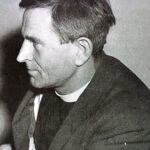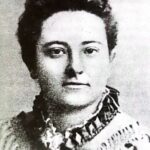LAWSON, T.G.
Thomas George Lawson (circa 1814-June 1891) was a chief’s son who became the first official interpreter and messenger operating between the colonial administration and the chiefs of the Sierra Leonean interior. So important was his function in maintaining good relation that his informal department was eventually turned into an Aborigines Branch of the Secretariat. He was given special recognition at the end or his long career.
He was born probably in 1814, the son of George Lawson, the chief of Little Popo, in what is now the Republic of Togo. It was common practice in the 19th century for chief’s partial to the British to ensure that their sons had an English education and in 1825 Thomas George was sent to England for this purpose.
He broke his journey in Freetown, however, becoming the protégé of John McCormack (q.v.), and stayed there for the rest of his life. McCormack, Lawson’s patron and teacher, was an Irishman whose trading activities, particularly with the Temne had given him valuable knowledge of the people of the interior. He frequently served as representative of the government, undertaking missions and conducting negotiations with chiefs in the northern interior on behalf of the colony.
Lawson accompanied McCormack on his trading visits and official missions. Lawson readily learned several languages which stood him in good stead for his later duties as interpreter, as did his personal relations with neighboring chiefs. These became friendly enough for him to marry the granddaughter of Bai Farma of Koya, a chiefdom to the east of Freetown.
In 1846 he entered the colonial civil service in a temporary capacity as government messenger but in 1852 he was appointed “Native Interpreter and Government Messenger,” a post which he held till his retirement in 1886. Because of his “knowledge of the languages spoken by the neighboring nations, uniform, steady and correct conduct,” and the high personal esteem accorded to him by African rulers who had had dealings with colonial officials, he was considered to be the most suitably qualified person for the appointment.
His duties as government interpreter, which also combined the functions of a police inspector, were many and various. He interpreted between governors or colonial officials and local rulers at meetings, and also in the law courts. As messenger, he ensured that Freetown’s policies and demands were properly understood by the chiefs to whom they were directed.
He also paid out stipends to chiefs and entertained in his own home, chiefs and other official visitors from areas surrounding Freetown, supervised the education of various chiefs’ sons in Freetown, and reported on such topics as “natives”, “escaped slaves” “political prisoners”, and the arrival of traders.
In time, he took on an advisory role and began to initiate policy changes but here his effectiveness was contingent on the attitudes of governors towards accepting his advice.
As his official duties increased, Lawson’s original salary of £l00per annum was progressively raised until by 1882 he earning £350 per annum. But from the early 1880s when Lawson’s health started to break down, reducing him on some occasions to working from his house, the question of a suitable successor had to be raised.
Various officials had been appointed to lessen his administrative burden as age took its toll, including his eventual successor, James C.E. Parkes (q.v.). But he still kept control of the Aborigines Branch, as it became known in 1878.
Lawson’s loyalty and devotion to duty was commended by several governors. He was strongly anti-French and always suspicious of French activity, even in the field of religious proselytizing.
Only once, during the crisis over the implementation of the Masama Treaty in 1879, was his interpretation ever criticized. The Temne chiefs held that the treaty had been drafted as a peace agreement, following their conflict with the Soso, whereas the British authorities held that it was a treaty of cession affecting the coastal area in the Scarcies region.
The chiefs also declared that when the terms of the treaty had been discussed, three years earlier, they had not signed it. The situation brought Lawson’s reputation as an interpreter into question. He weathered the storm, however, and his interpreting abilities remained respected.
In 1883, Governor A.E. Havelock (term of office 1881-84) recommended Lawson be awarded the honor of Commander of Saint Michael and Saint George (C.M.G.), but the Colonial Office did not act upon it.
In 1886, Lawson declared his intention of retiring at the end of the year, a matter which caused concern as to whether his successor in this important task of liaison with the peoples of the interior would be competent to perform his duties with equal skill.
Parkes was being groomed to take over his position, and together they produced an account of relations with the surrounding territories (Information Regarding the Different Districts and Tribes of Sierra Leone and Its Vicinity,” a confidential memorandum to the Colonial Office), almost entirely the product of Lawson’s rich memory.
Described by Governor Sir Samuel Rowe (terms of office 1877-80 and 1885-88) as “alone and without equal in the history of Her Majesty’s settlements on this Coast,” Lawson’s retirement required special Commemoration. It was decided to award him a personal decoration and in 1886 at an impressive ceremony he was presented with a silver chain and plaque in appreciation of his services.
Even after his retirement in December 1886 on a pension of £210 per annum, he continued to give willing advice and to be responsible for hospitality to official visitors from the surrounding areas.


